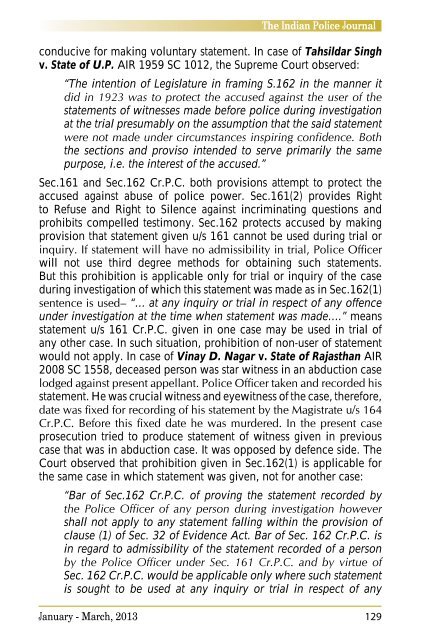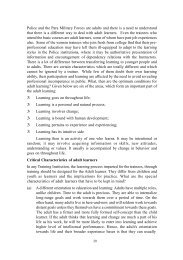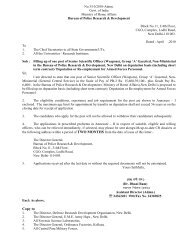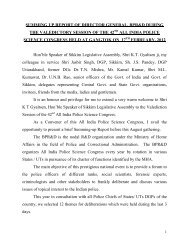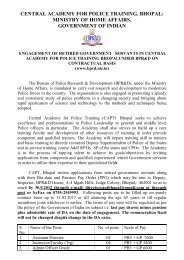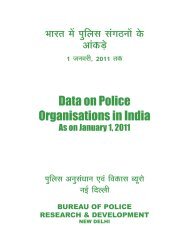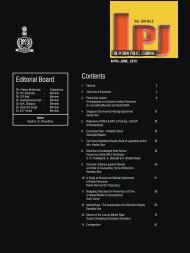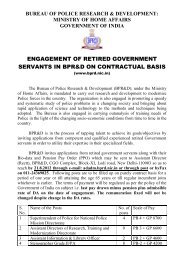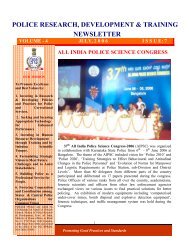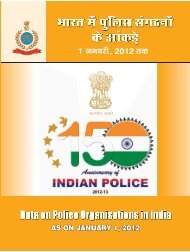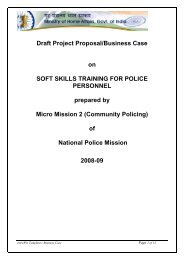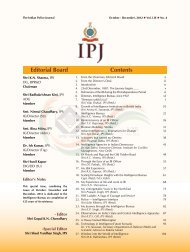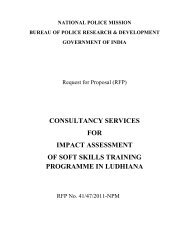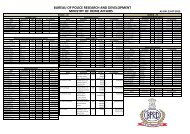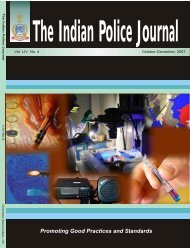by Police - Bureau of Police Research and Development
by Police - Bureau of Police Research and Development
by Police - Bureau of Police Research and Development
Create successful ePaper yourself
Turn your PDF publications into a flip-book with our unique Google optimized e-Paper software.
The Indian <strong>Police</strong> Journalconducive for making voluntary statement. In case <strong>of</strong> Tahsildar Singhv. State <strong>of</strong> U.P. AIR 1959 SC 1012, the Supreme Court observed:“The intention <strong>of</strong> Legislature in framing S.162 in the manner itstatements <strong>of</strong> witnesses made before police during investigationat the trial presumably on the assumption that the said statementthe sections <strong>and</strong> proviso intended to serve primarily the samepurpose, i.e. the interest <strong>of</strong> the accused.”Sec.161 <strong>and</strong> Sec.162 Cr.P.C. both provisions attempt to protect theaccused against abuse <strong>of</strong> police power. Sec.161(2) provides Rightto Refuse <strong>and</strong> Right to Silence against incriminating questions <strong>and</strong>prohibits compelled testimony. Sec.162 protects accused <strong>by</strong> makingprovision that statement given u/s 161 cannot be used during trial orwill not use third degree methods for obtaining such statements.But this prohibition is applicable only for trial or inquiry <strong>of</strong> the caseduring investigation <strong>of</strong> which this statement was made as in Sec.162(1)“… at any inquiry or trial in respect <strong>of</strong> any <strong>of</strong>fenceunder investigation at the time when statement was made….” meansstatement u/s 161 Cr.P.C. given in one case may be used in trial <strong>of</strong>any other case. In such situation, prohibition <strong>of</strong> non-user <strong>of</strong> statementwould not apply. In case <strong>of</strong> Vinay D. Nagar v. State <strong>of</strong> Rajasthan AIR2008 SC 1558, deceased person was star witness in an abduction casestatement. He was crucial witness <strong>and</strong> eyewitness <strong>of</strong> the case, therefore,prosecution tried to produce statement <strong>of</strong> witness given in previouscase that was in abduction case. It was opposed <strong>by</strong> defence side. TheCourt observed that prohibition given in Sec.162(1) is applicable forthe same case in which statement was given, not for another case:“Bar <strong>of</strong> Sec.162 Cr.P.C. <strong>of</strong> proving the statement recorded <strong>by</strong> shall not apply to any statement falling within the provision <strong>of</strong>clause (1) <strong>of</strong> Sec. 32 <strong>of</strong> Evidence Act. Bar <strong>of</strong> Sec. 162 Cr.P.C. isin regard to admissibility <strong>of</strong> the statement recorded <strong>of</strong> a person Sec. 162 Cr.P.C. would be applicable only where such statementis sought to be used at any inquiry or trial in respect <strong>of</strong> anyJanuary - March, 2013129


